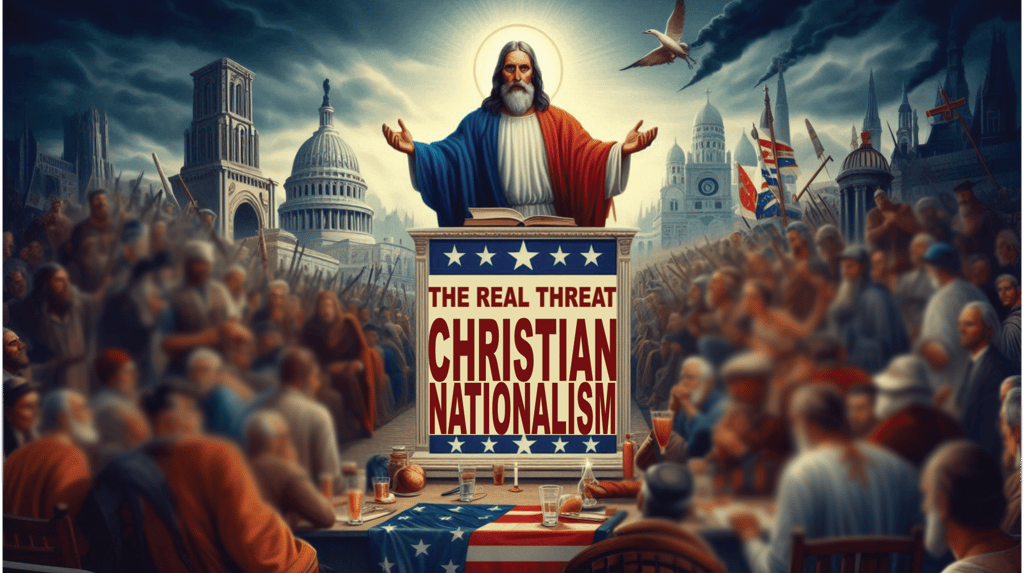The Very Real Threat to Faith: Christian Nationalism
BY JULIE TAYLOR
3 min read


The Very Real Threat to Faith: Christian Nationalism
By Julie Taylor
Certainly, if we were all doing our part, as Jesus asked, then we wouldn’t see the amount of wickedness that we do.
What if we just forced people to maintain a specific code of moral behavior? Would the world, or at least our nation, be a better place? Christian Nationalism is an ideal that reflects a desire to maintain and promote a specific cultural and religious identity within the national framework.
Imagine being told, ‘You can worship any way you choose, as long as it’s Christian.’
Promoting the idea that the U.S. should be governed by Christian values can lead to the marginalization of non-Christian citizens and minority groups. What about those who do not share this identity? This can lead to exclusion and discrimination against religious minorities, non-religious individuals, and those who do not conform to traditional Christian values.
Matthew 11:28
“Come to me, all of you who are tired from the heavy burden you have been forced to carry. I will give you rest.”
What Jesus doesn’t say is significant here; He didn’t say, “Only Christians come to me.”
John 3:16
“Yes, God loved the world so much that he gave his only Son, so that everyone who believes in him would not be lost but have eternal life.”
The key word here is ‘everyone.’
The Christian Nationalist ideology can deepen societal divides by fostering an “us vs. them” mentality, which can lead to increased discrimination and hostility towards those who do not share the same religious beliefs. We all come to God at different times and by different routes. Eliminating an individual’s choices undermines the very fabric of religious freedom. And although He desires us to, God doesn’t force us to devote our lives and hearts to Him. Government shouldn’t either.
Christian nationalism often overlooks critical issues such as poverty, racism, and environmental justice, focusing instead on maintaining traditional power structures that benefit a select group. There is often a focus on protecting the nation from perceived threats posed by non-Christians, immigrants, and other groups seen as undermining Christian values and identity.
In Isaiah 58:6-7, God tells us plainly that our concern should always be for the marginalized and underserved:
“I will tell you the kind of day I want—a day to set people free. I want a day when you take the burdens off others. I want a day when you set troubled people free, and you take the burdens from their shoulders. I want you to share your food with the hungry. I want you to find the poor who don’t have homes and bring them into your own homes. When you see people who have no clothes, give them your clothes!”
Christian nationalists typically support several key ideals, such as seeking to integrate Christian principles into the legal and cultural framework of the nation. This can involve efforts to reinstitute prayer in public schools or amend the Constitution to reflect Christian heritage. Further, Christian nationalists typically support policies that align with their interpretation of proper Christian morality. This can include opposition to abortion, same-sex marriage, and other social issues they view as contrary to their religious beliefs. They often oppose civil rights for LGBTQ+ individuals and other marginalized groups. By advocating for laws and policies based on specific religious beliefs, Christian nationalism can restrict the rights and freedoms of these groups.
The beauty of God’s creation is our diversity. Huge strides have been made to reinforce the fact that God doesn’t make mistakes, that we all have the right to be who we truly are without shame or persecution. The danger in undermining laws of freedom and choice with regard to faith and lifestyle isn’t just a potential threat looming in the distant future—they are present-day dangers. Recent Supreme Court decisions have reflected Christian nationalist influences, such as expanding public funding for religious education, authorizing prayer in public schools, and striking down abortion rights.
When we look around, we can clearly see that the world is not set up to follow or even celebrate Christ Jesus. Everywhere we turn, we can see greed, dissension between groups of people, poverty, oppression, conquest, and lust for wealth, power, and control. Jesus taught us to love one another, promote peace, forgive one another, and help the poor and underserved.
Following the laws established by our government is proper, even biblical, but God has always been the primary source for determining what changes an individual should make in their lives. Christian nationalist ideals reflect a desire to maintain and promote a specific cultural and religious identity within the national framework. They collectively pose a significant threat to religious freedom and the inclusive, democratic fabric of society. Any citizen who places their devotion to Christ on the same level as their allegiance to their country is guilty of idolatry. The transformation of an individual’s moral code comes from God.
Isaiah 64:8, ESV
“But now, O Lord, you are our Father; we are the clay, and you are our potter; we are all the work of your hand.”
Empowerment
Reclaiming faith for all.
Connect
© 2024. All rights reserved.
Content Disclaimer: All content shared on Pride Faith Voices belongs to the individual writers and reflects their personal views and experiences. These opinions and perspectives do not necessarily represent the official stance of Pride Faith Voices as a whole.
